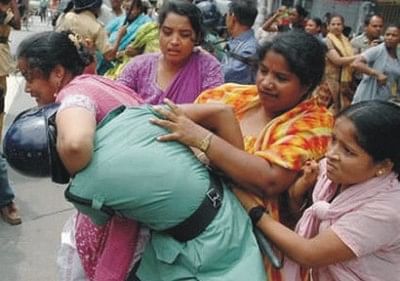Combat in the court room

WANT to win a lawsuit? Here's a tip. Minimise the use of hand-to-hand combat in the court room. It is considered gauche. This is doubly true if you are a member of the legal profession.
This advice is derived from my reading of a recent case in Haryana, a district in the Punjab area of India.
Details were brought to my attention by a reader named Priti, who is trying to decide whether she wants to get married or not.
This is what happened. Two young people, Monica and Kunal, met. They fell in love. They got married. The families, naturally, were outraged. How dare the bride and groom think they have a say in the matter! What has any of this to do with them!?
The parents, who believe only in arranged marriages, sent the happy couple threats of violence. The scared young couple asked judges at the Punjab and Haryana High Court Complex for legal protection and a hearing was scheduled for this purpose.
But on the day itself, new husband Kunal Mahajan was horrified to see his mother-in-law turn up at the courthouse and demand to speak to her daughter Monica. Lawyer Sanjeev Sharma bravely placed himself between the couple and the woman. Courtroom disputes were solved through talk, not fighting, he explained.
The infuriated mother-in-law whipped off her sandals and used them to beat up the lawyer. Family members piled in, giving the attorney and the couple a good thrashing. Other lawyers saw what was happening, and intervened. They were also beaten up.
The battle escalated. Soon, a posse of angry members of the legal profession was calling for blood. Court guards herded the family members into a security room for their safety. But the mob of frothing lawyers tried to smash the wall down. (I'm not sure what happened to the notion that courtroom disputes were solved through talk.) Then the media arrived and started filming. Fists flew, cameras were damaged, and they also joined the fight.
Eventually, a group of international border guards, the Indo-Tibet border battalion, were summoned. If they could keep a billion people in China and a billion people in India separate, they might just have a chance of keeping these fighters apart, judges hoped.
If the fight continues to grow at its current rate, it will involve every person on earth by the end of December and every sentient being in the universe by January 5.
I could see why Priti had been put off the idea of marriage.
"Do all marriages involve so much fighting?" she asked.
I replied: "Certainly not. Some have more."
But I told her that if she took certain precautions, such as not marrying billionaire golfers, married life wasn't that bad.
Marital disputes can be easily solved by making compromises, I explained. The male party apologises and the female party accepts the apology, folds her arms and looks smug. (This works for me every time.)
In the meantime, I got an interesting letter on this subject from Thomas Siefert, also known as TS: "The high success rate of arranged marriages is probably conditioned by the culture in which they take place. If bride, groom, family and the rest of the society accept an arranged marriage as the norm, then everyone will work towards the success of the marriage. When people with such a culture move to a "free choice" country and let their children grow up there, but insist on marrying away their children at their discretion, it doesn't really work. The children have seen everyone around them finding their own partners and want the same."
Priti decided that her best bet was to marry a Western guy, since they were relatively independent of their families. The conversation ended when she announced she was thinking of moving to the UK.
Shortly afterwards, she called back and told me she had discovered a statistic about British men that horrified her. More on this topic later.
To uncover more on Priti's horrific discovery for some of you hopefuls, visit our columnist at www.vittachi.com

 For all latest news, follow The Daily Star's Google News channel.
For all latest news, follow The Daily Star's Google News channel. 



Comments